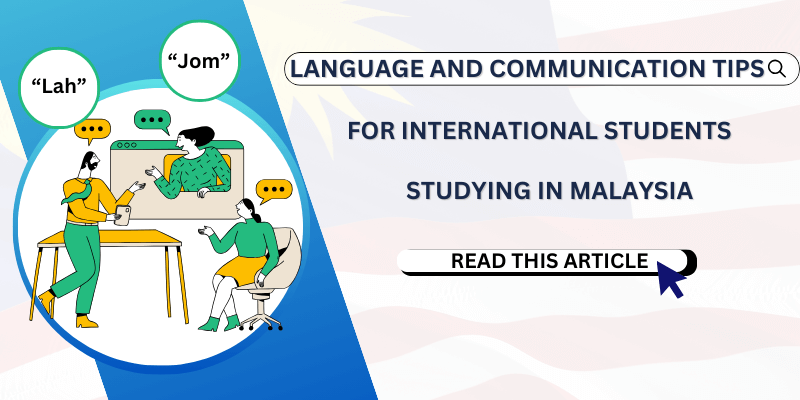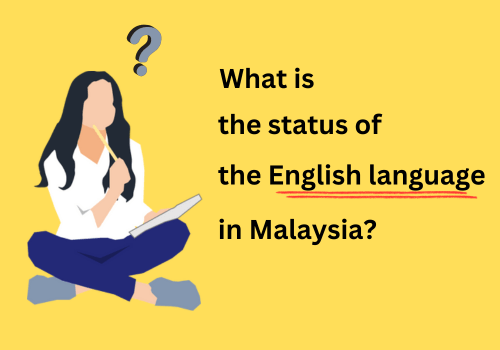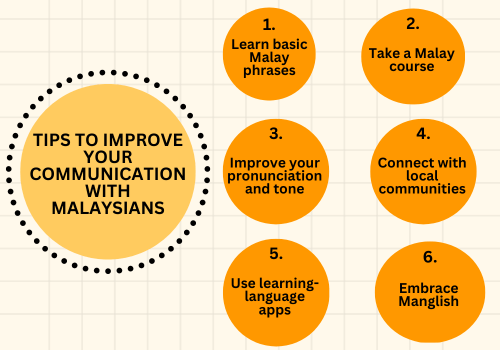Language and Communication Tips for International Students Studying in Malaysia
May 29, 2024
Anis

Starting an educational journey in a foreign country brings opportunities and challenges.
If you are an international student in Malaysia, you will experience a diverse culture and language.
Although Malaysians are generally known for being friendly, it is important to understand their national language, Bahasa Melayu, and how people communicate to do well in your studies and social life.
So, we will share some important information about their national language and helpful tips for international students studying in Malaysia.
Hopefully, with these tips, you can navigate your educational journey in Malaysia smoothly.
Overview of Malaysia’s national language
Bahasa Melayu is Malaysia’s official language and it holds great importance in local culture.
As an international student in Malaysia, investing time and effort in learning Bahasa Melayu is rewarding.
This language not only connects you with local society but also provides a deeper understanding of Malaysian culture.
Speaking Bahasa Melayu allows you to actively engage with locals, breaking down language barriers effortlessly.
This proficiency opens doors to meaningful interactions, social activities, and cultural events throughout your study days in Malaysia.
Moreover, embracing Bahasa Melayu offers insights into the country’s diverse culture, traditions, and customary practices.
Other than the academic world, understanding the language can be beneficial for you - ordering food, shopping at local markets, building connections, and asking for help from the Malaysian people.
So, take your time to learn and understand Bahasa Melayu, and you will find yourself comfortably leading your educational journey in Malaysia.
What is the status of the English language in Malaysia?

In Malaysia, English is just as important as Bahasa Melayu. Malaysians comfortably use English in formal settings like work meetings and academic institutions.
But you will also hear it in everyday places like shopping malls and social gatherings. Using English becomes a way for everyone to connect easily.
Now, do international students need to be really good at English?
Not exactly. While fluency is not a must, it can make your time studying in Malaysia much more enjoyable. Many Malaysians speak English well, making it easy to chat with people from different countries.
However, not every Malaysian is fluent in English. In such cases, Malaysians use alternative communication strategies – simplifying English, using body language, and sometimes even slipping into Manglish (Malaysian English).
These are common ways for Malaysians to overcome communication challenges. And these approaches do not follow proper English rules. For instance, Manglish, a mix of English and local languages, may not follow conventional English grammar, but it's still understandable.
So, as an international student in Malaysia, there’s no need to stress about being perfect in English. Enjoy the learning process, and try out new ways to communicate.
Understanding a bit of English and Malaysians' unique ways of talking might just add some fun to your days studying in the country.
How language fluency affects your study in Malaysia?
Language skills play an important role in shaping your experiences as an international student in Malaysia. They have a significant impact on various aspects of your journey, including academics, social connections, and job opportunities.
Your academic success relies on proficiency in the languages used in academic settings, particularly English.
Since most universities in Malaysia conduct courses in English, it is crucial for you to have a strong command of the language.
Being fluent in English enables you to not only understand lectures but also actively engage in discussions, write papers, and excel in exams.
This proficiency becomes a key factor in navigating course materials, staying on track with the curriculum, and achieving academic excellence.
Other than academics, language proficiency may lead to effective communication and seamless social integration.
By mastering the local language, such as Bahasa Melayu, or adapting to colloquial Manglish, fosters comfortable interactions with your peers, professors, and locals.
This ease of communication extends to building friendships, participating in extracurricular activities, and immersing yourself in cultural exchanges, which foster a sense of belonging within the local community.
Moreover, your language proficiency acts as a gateway to a deeper understanding of the local culture and enhances your job prospects in Malaysia.
Many industries in the country use local languages as the primary medium for business communication.
By being proficient in these languages, you can effectively communicate your skills and qualifications, which provides a significant boost to your job prospects, internships, and networking opportunities.
It empowers you to navigate the professional landscape with confidence and form meaningful connections with employers and colleagues.
Hence, your language proficiency significantly shapes how well you adapt to the Malaysian environment.
It not only enhances your academic success but also contributes to a smoother transition, increased comfort in your daily life, and the ability to navigate various situations with ease.
How can you improve your communication with Malaysians?

1. Learn basic Malay phrases
To communicate well with Malaysians, it is important to learn some simple phrases in Bahasa Melayu.
Let's explore why these phrases are important and how they can help you connect with people.
Learning basic greetings is key to good communication in Malaysia. Phrases like "Selamat pagi," (Good morning) "Selamat petang," (Good evening) or "Selamat malam" (Good night) show the friendly and polite culture of Malaysia.
Using these greetings at the right time of day helps create respect and friendly interactions.
Saying "Terima kasih" (Thank you) shows your gratitude and appreciation over someone’s kindness in assisting you.
When you want someone's attention or need to apologize, saying "Maafkan saya" shows that you respect their personal space and are polite in your interactions.
Other than greetings, you can also learn some basic conversation phrases to enhance your communication skills.
Phrases like "Apa khabar?" (How are you?), "Saya tidak faham," (I don’t understand) or "Boleh saya tanya?" (May I ask?) lead you to have simple conversations, ask for clarification, and express your interests or needs.
Learning these phrases isn't just about the language – it's also about showing respect and interest in the local culture.
When you understand and use these phrases, it creates a positive impression when you talk to Malaysians.
Don't worry if you're not fluent right away. Even knowing a few basic phrases can help you connect with locals and build meaningful relationships.
2. Take a Malay language course at the university
As an international student in Malaysia, you have access to a valuable resource – language courses designed specifically for you.
These courses, offered by universities or language centres, aim to improve your language skills while immersing you in the local culture.
These language courses have a structured curriculum that covers important aspects of language like vocabulary, grammar, pronunciation, and reading.
Through interactive classes, you get to practice speaking, listening, reading, and writing in Bahasa Melayu, which helps you become better at using the language in real-life situations.
Experienced teachers who understand the challenges faced by non-native speakers guide these courses.
They use interactive teaching methods to encourage active participation and make the learning experience dynamic and enjoyable.
But these courses are more than just language learning. They also introduce you to Malaysian customs and traditions, providing a cultural immersion.
Understanding local customs, traditions, and manners helps you become more culturally aware and improves your ability to communicate with Malaysians.
Attending these language courses not only benefits you academically but also connects you with a community of learners.
You can engage in group activities, practice with other students, and share experiences with fellow international students who are on the same language-learning journey.
It's not just about learning; it's an opportunity to create a supportive environment for mutual growth.
By taking advantage of these language courses offered by Malaysian universities and educational institutions, you can improve your language skills and gain a deep understanding of the local culture.
Embrace this opportunity and let language learning become a gateway to exploring the culture and forming meaningful connections during your academic journey in Malaysia.
3. Improve your pronunciation and tone
When you come to Malaysia as an international student, it brings exciting opportunities, but it also comes with unique challenges, especially in communication.
Getting the pronunciation and tone right is very important because it affects how well you can connect with the local people.
If you pronounce words incorrectly or use the wrong tone, it can lead to confusion and give a bad impression.
So, how can you deal with these challenges and improve your communication skills?
A good approach is to surround yourself with native speakers and listen carefully to how they speak.
Pay attention to their pronunciation, which parts they emphasize, and how their voice goes up and down naturally.
By imitating their style, you can gradually develop a more natural way of speaking.
It is also helpful to find someone who is good at the language and practice with them regularly. Ask for feedback on your pronunciation and tone so that you can keep getting better.
Knowing the right tone to use in different situations is equally important. In casual conversations, a relaxed tone may be appropriate, but in formal settings, like consulting with your lecturer, you need to be more careful and respectful.
Adapting your communication style to different situations helps you interact effectively with many people.
4. Build connections with local communities
As an international student in Malaysia, actively participating in cultural activities can help you form meaningful connections and communicate effectively with the locals.
These activities provide shared experiences that serve as a strong foundation for engaging conversations.
Getting involved in Malaysia's lively festivals like Hari Raya, Deepavali, or Chinese New Year open houses and attending performances or traditional ceremonies with local friends allows you to fully immerse yourself in the local culture.
These firsthand experiences become stories that you can share with Malaysians, creating opportunities to start conversations, express your thoughts, ask questions, and show genuine interest in the cultural significance of each event.
Participating in cultural activities goes beyond just being present – it sends a powerful message of appreciation for Malaysian culture.
Your active participation demonstrates sincere respect for local traditions, making a positive connection with the locals.
Malaysians take pride in their cultural heritage, and when they see your enthusiasm and eagerness to learn, it fosters openness and a willingness to engage in meaningful discussions.
This appreciation for Malaysian culture acts as a bridge, connecting different cultures and promoting understanding and acceptance.
By actively participating in cultural activities, you not only enrich your own experiences but also contribute to the harmonious exchange between people from diverse backgrounds.
5. Use learning-language apps
As an international student studying in Malaysia, enhancing your language skills is a key aspect of a successful academic journey.
In this regard, language-learning apps present valuable tools tailored to your needs, providing a range of features to support your language development.
When you explore language-learning apps, you open up a world of possibilities. These apps offer vocabulary-building exercises and flashcards right at your fingertips,
They help you expand your word bank and learn new words in context.
By engaging in these exercises, designed with you in mind, you can lay a solid foundation for academic success and effective communication in your daily life.
Moreover, these apps make the learning of grammar easier. They provide grammar lessons, quizzes, and interactive exercises that empower you to not only understand the rules but also practice their application.
With resources tailored specifically for international students, you can gain a solid grasp of grammar, enabling you to communicate effectively in written assignments and boosting your confidence.
Language-learning apps also cater to those aiming to improve their listening and speaking abilities.
They offer audio lessons and exercises, allowing you to listen to engaging dialogues, practice pronunciation, and engage in speaking exercises.
These resources create an immersive environment that hones your skills in a way that aligns with your academic and social needs.
Furthermore, language apps recognize the importance of reading comprehension.
They provide a spectrum of reading materials tailored to different proficiency levels, enabling you to progress at your own pace.
By immersing yourself in diverse texts, you not only enhance your comprehension skills but also gain insights into the cultural differences embedded in the language.
6. Embrace Manglish
Malaysians take great pride in embracing Manglish as a distinctive form of communication.
In fact, Manglish serves as a cultural identity and a means of creating bonds in a casual and familiar manner. Manglish acts as a remarkable cultural bridge that unites Malaysians from diverse backgrounds.
Malaysia, being a melting pot of different ethnicities, incorporates words and phrases from languages like Malay, Chinese, and Tamil. This linguistic blend transforms Manglish into a shared language that effortlessly transcends ethnic boundaries, fostering understanding among its speakers.
For international students, adapting to Manglish is more than a linguistic endeavor – it's a valuable skill that enhances communication in Malaysia.
To effectively navigate Manglish, it is important to familiarize yourself with prevalent expressions, words, phrases, and idioms commonly used in informal conversations.
This linguistic familiarity not only facilitates effective communication but also contributes to a more culturally enriching experience in your interactions with Malaysians.
Let’s start with simple greetings or commonly used phrases. Here are a few examples of commonly used phrases in Manglish:
| Malay word | Meaning | Common phrase example |
|---|---|---|
| Boleh | Can/ able to |
"Boleh I join lunch with you?" Meaning: Can I join you for lunch? |
| Makan | Eat |
“Where/ what to makan?” Meaning: Where/ what do you want to eat? |
| Jom | Let's |
“Jom, eat here.” Meaning: Let’s eat here. |
| Lah |
"Lah" is a common particle in Manglish. It is often used to add emphasis, convey a sense of casualness, or soften a statement. While "lah" doesn't have a specific meaning on its own, it’s usually used with an informal and friendly tone. |
“This one is okay lah” Meaning: This one is not bad. |
Based on the examples above, you may notice that the usage of Manglish does not follow the proper English subject-verb agreement. This is because Manglish is used for informal communication, where correct grammar usage is not emphasized.
In other words, by incorporating Manglish into your speech, you not only demonstrate linguistic adaptability. But you also showcase an understanding of the cultural differences embedded in everyday Malaysian conversations.
It becomes a way to actively participate, breaking down communication barriers and fostering a sense of camaraderie with the locals. This level of engagement can lead to meaningful connections and a more immersive experience in Malaysian culture.
In conclusion, mastering language and communication is not only necessary but also the path to a fulfilling academic and cultural experience for international students in Malaysia.
The country's diverse multicultural environment provides a unique platform for personal growth and academic success. While English is widely spoken, having a basic understanding of Bahasa Melayu can open doors to deeper interactions and cultural understanding.
It is not just about communication; it is also about creating connections with Malaysian society. Failing to improve language skills can lead to challenges, resulting in misunderstandings and missed opportunities for meaningful connections.
Just think about the valuable exchanges that could be overlooked, both in academics and social settings, if language remains a barrier.
However, by actively engaging with the local language and immersing oneself in the cultural nuances, students can enhance their study experience. It's more than just excelling in exams; it's about forming connections that go beyond language barriers, making every aspect of daily life smooth and enriching.
So, as you begin your academic journey in Malaysia, view language not only as a tool but as a bridge to a world of opportunities.
Embrace the cultural diversity, seize the opportunity for linguistic growth, and witness how it transforms your time as an international student in this vibrant and welcoming nation.
Kickstart your education in Malaysia
We'll help you find and apply for your dream university
You might be interested in...
- Sunway University Educators Share Timeless Career Skills for a Changing World
- Top Private Universities in Malaysia (QS Rankings 2026)
- APU and GUT Launch New Tech College in China: Earn Dual Degrees
- Global Learning at the Crossroads: Canada–Malaysia’s Evolving Education Partnership
- How AI is Powering the Next Wave of MSME Growth in Malaysia
- Sunway University Climbs to Global Top 500 in QS Rankings 2026
- Trusted by Top Universities: EasyUni’s Exclusive Visit to Sunway University
- Wawasan Open University and Sophic Automation Partner to Offer Work-Based Learning for Engineering Students
- Sunway University: Malaysia’s Best Cambridge A-Level College with 11 Years of Excellence
- Top Malaysian Universities in QS Asia Rankings 2025
 +60173309581
+60173309581





